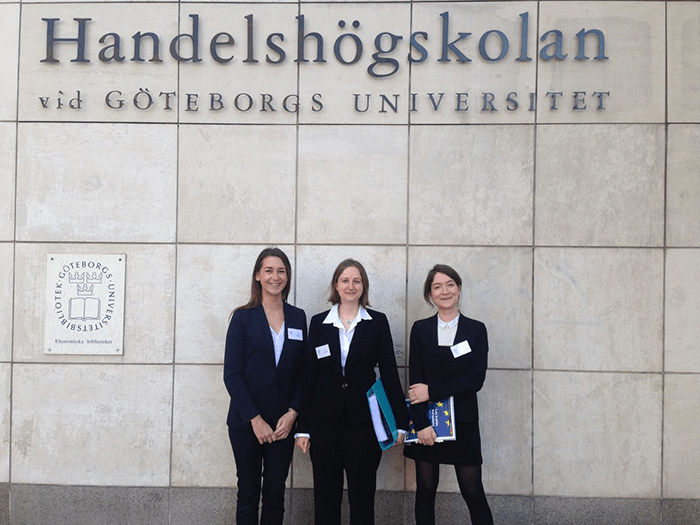3 hec student qualify for the final of the european law moot court
Julie Benedetti and her team mates will be given the opportunity to plead before the judges at the Court of Justice of the European Union.

The European Law Moot Court is a law case competition that brings together students from top European and North American universities every year. In this year’s 2017 edition, the team at HEC Paris, made up of Julie Benedetti (Grande Ecole - Major Stratégie fiscale et juridique internationale), Elodie Gianferrara (Master in Management & Business Law - Double Degree with Paris 1) and Aude Chartier (MS/LLM Droit et Management International), were given the opportunity to make their case at the University of Gothenburg.
Following the victory of Julie Benedetti who played the role of Advocate General, the team came third in the regional finals, landing them a place in the grand final which will take place at the Court of Justice of the European Union.
Julie Benedetti takes us back over her best moments from the competition so far.
What topic is the competition centered on this year and what was your argument/plea?
This year, the case focused on a re-write of the Greek Debt Crisis, with it taking place in the imaginary country of « Bezdomny », investigating the juristic issues linked to the Banking Union, the power of the European Central Bank and their control over the decisions by the Court of Justice of the European Union.
As general counsel, my argument consisted of helping the court in its decision and presenting a juristic point of view: therefore I had to focus on the challenge of the case within the overall structure of European law, taking into consideration the case law of the court and the consequences that their decision could have for the European Union and its citizens. I also had to propose a conciliation between the introduction of a supervision system and the resolution of the European banking union, whilst respecting fundamental rights, notably those of property and effective legal protection.
How did you put forward your argument to the jury? For what reasons do you think won first place?
Presenting your argument is a truly privileged moment, after many months of work we were lucky to be able to put forward our conclusions to practitioners of European law, professors and clerks of the court. I tried to make it as off the cuff as possible so it didn’t seemed recited, more like a discussion or a debate: the jury aren’t just there to interrogate you and glossed over certain inaccuracies and gaps when it came to facts. What was essential was confidence and being able to reason with them in a coherent and well-argued manner.
I think the deciding factor came down to our ability to work systematically as a group: I knew the positions being defended by my two other team mates, they knew mine and that allowed us a more rounded view of the case. Speaking English also played an important role, as the competition is in both English and French so the judges can decide to switch languages at any moment when asking questions during the hearing.
How will you prepare for the final at the Court of Justice of the European Union?
We leave at the end of March to make our case before the Court in Luxembourg! The essential work to be done up until then will be to add depth to our research and stay up to date with Court decisions that could echo the case in hand. I’m also going to practice my speaking as much as possible and carry out question and answer exercises with the rest of the group.